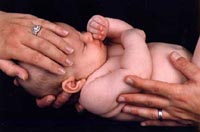New Year's babies make German parents eligible for fattened benefits
Fortunately for her parents, little Inka Angelina took her time, only emerging into the world when 2007 was an hour old meaning her parents just qualified for generous new family benefits aimed at raising Germany's lagging birthrate.

Julia Gotschlich and her husband stood to lose out on more than Ђ10,000 (US$13,200) if the baby arrived before midnight, when the new financial assistance took effect.
As it turned out, little Inka held off long enough and helped mom finance a full year off work as opposed to just eight weeks with her first child.
"At first, I thought: 'Can't you wait a little longer?"' Gotschlich said at Berlin's Auguste-Viktoria Hospital, where she is recovering after the slow but uncomplicated delivery.
As midnight approached, "the doctors and midwives were encouraging me that maybe we would make it into the New Year after all, and we did," she said, smiling at her daughter asleep in a bassinet at her side.
Facing an alarming demographic trend, the German government has shaken up its financial assistance to parents in a bid to make it easier for working women to have children and revive a birth rate of 1.4 children per woman one of the lowest in Europe. It's an attempt to match incentives in other countries such as France and Sweden, which show higher birthrates.
A recent government study forecast that Germany's population will drop by as much as 16 percent by 2050, from the current 82.4 million to as little as 69 million. That could hurt the economy by sapping the work force and undermine the state pension system.
The new "Elterngeld or "parent money" allows an adult who stops work to claim two-thirds of their net wage, up to a maximum of Ђ1,800 (US$2,375) per month. Low earners can even claim 100 percent compensation for lost wages.
One parent can claim for up to 12 months; if both parents take a turn, they can claim the benefit for a total of 14 months a tweak designed to encourage more fathers to help.
Germany previously paid a flat Ђ300 (US$400) a month in "upbringing money" benefit to needy parents. The switch is expected to raise the annual outlay by about Ђ900 million (US$1.2 billion) to Ђ3.8 billion (US$5 billion).
There had been media reports about women taking magnesium tablets, which can prevent premature labor, or putting off planned Caesarian births in hopes of making the Jan. 1 start date for the assistance. However, officials at several hospitals denied reports of a Jan. 1 baby boom.
Charlotte Deppe, a senior doctor at Munich's Grosshadern hospital, said several women had asked about delaying the birth until the new year, but dropped the idea under medical advice.
Klaus Grunert, a veteran doctor at the Berlin hospital, said several women with an eye on the extra cash had avoided things thought to help induce labor from hot baths and massages to sex, reports AP.
But he said none had asked doctors to help delay the birth and that all would in any case have been refused.
Subscribe to Pravda.Ru Telegram channel, Facebook, RSS!




